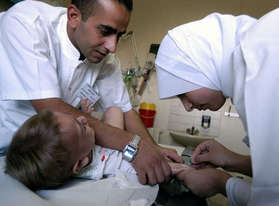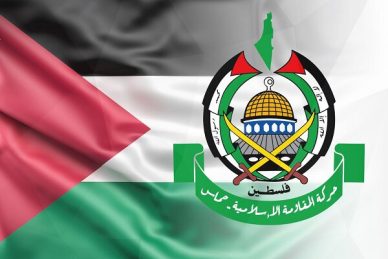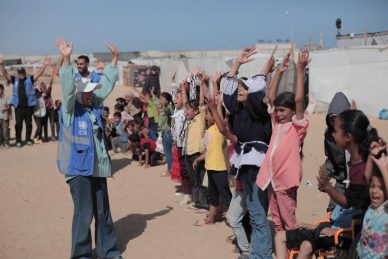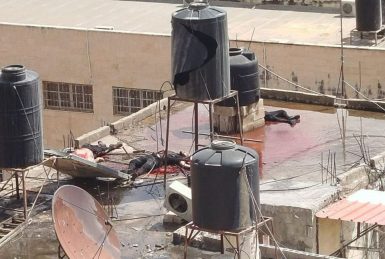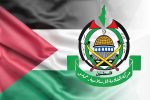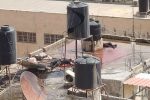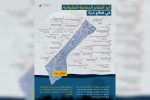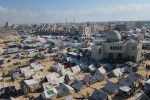Muhammed Salim 38 from a small town near Hebron. He suffers from a genetic blood disease which requires lifelong treatment with expensive drugs. However government hospitals in the West Bank hard-hit by the Israeli-western financial embargo on the Palestinian Authority (PA) government have not been able to make available certain varieties of vital medicines. The Health Ministry simply doesn’t have the funds to buy such medicines from abroad.
Salim is not only suffering from an incurable disease. He is also poor and can’t save enough money to buy the expensive drug from the private sector in order to stay alive.
“I don’t know what to do it seems Israel and the United States (and I must say the Arab states as well) not only want to starve us they want to kill us as well. Can you imagine a world order that is more satanic more diabolic?”
Salim is only one of thousands or probably tens of thousands of Palestinians who have been affected by the deterioration of the health care system in the occupied Palestinian territories.
According to Palestinian health officials less and less funds are being allocated to public hospitals due to the siege.
“And whatever funds we have go only for the essentials” said the official who asked for anonymity because he is not authorized to speak to the media.
Last year the European Union said it would give partial payments to employees in the public health sector to keep it afloat. However the payments proved to be too little and coming too late and failed to stabilize the public health sector.
Eventually the dearth and irregularity of the payments forced the public health sector to go on a partial strike last month thus further exacerbating an already difficult situation.
According to Abdul Salam Abu Khalaf Spokesman for the Al-Ahli Hospital in Hebron the financial blockade affected the health care system in two ways:
First fewer ill people are now seeking medial care at private hospitals because they are too poor and too bankrupt to pay for hospitalization.
And second the hospitals themselves are feeling the pinch because “when ill people don’t come to hospital and when those who do come can’t pay the hospital can’t make money and consequently can’t sustain its operation in the long run.”
Khalaf said the US was being “very selective” in the way its “grants” are being disbursed in the occupied Palestinian territories.
“The Americans give grants to those who have ‘a certificate of good conduct.’ And our hospital has not had a certificate of good conduct from the Americans.”
Last year the American foreign aid agency known as USAID cancelled a program that would have provided medicinal and medical aid to the Ahli hospital worth $60000 to 70000 dollars.
USAID gave no reason for scrapping the program but it is widely believed that the reason might have to do with the fact that many religious doctors and nurses work at the hospital.
Abu Khalaf says that due to rampant poverty in the region the occupancy rate at the hospital was now only 40% compared to nearly 75% prior to the imposition of the siege.
Similarly he says that up to 40% of patients couldn’t afford to pay the bills thus placing further strains on the hospital’s finances.
A spokesman for the Palestinian Health Ministry said the “overall health care situation” was still more or less under control.
“Primary health care is still available virtually free of charge to all citizens and vital programs such as vaccination have not been affected.”
This week a report by the International Bank noted that the PA’s income from taxes dropped by roughly $17 million a month on average during the first six months of the Hamas-led government (March-September 2006).
In the same period in 2005 the PA’s average monthly income was $104 million. The PA’s expenses dropped by about half in the same period in 2006 but stood at about $93 million a month. The deficit for 2006 alone reached about $1 billion.
The suspension of international aid to the PA is actually dwarfed by the draconian Israeli measure of withholding a monthly sum of $50-60 million dollars of Palestinian customs revenue money for the purpose of forcing the Palestinian public to turn against the democratically-elected Hamas government in the hope that it would be replaced by another “moderate” government that would more or less come to terms with the Israeli occupation of Palestine.
Earlier this week a report issued by the UN showed that up to 80% of Gazans were depending on food aid.
For the time being the situation in the West Bank is not as bad as it is in Gaza . However one doesn’t need to be a prophet to predict that real starvation could spread to the West Bank if the current hermetic siege on the Palestinians continued.
Needless to say in this case the health care system would even suffer more and more Palestinians will die because of inadequate or non-existent health care.

